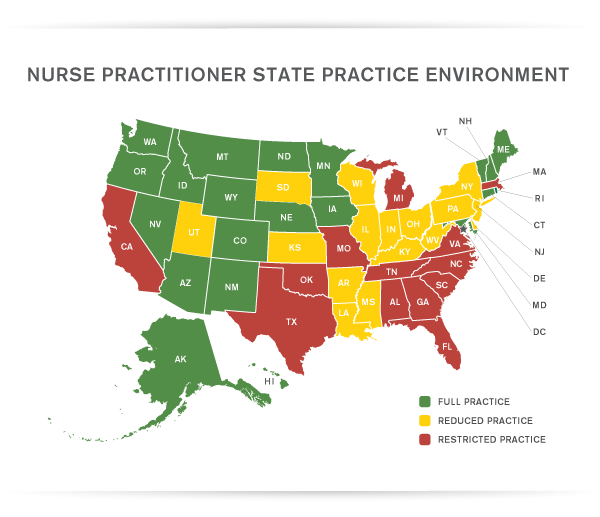The scope of practice for neonatal nurse practitioners (NNPs) varies widely from one state to the next. For locum tenens NNPs, holding a multi-state license may allow them to find work outside their primary state of residence (although applying to be an advanced practice registered nurse in member states is still required). This is made possible by the Nursing Licensure Compact (NLC), a nationally-recognized, multi-state agreement that allows nurses to practice across member states without having to apply for licenses in individual states. Nonetheless, it’s important to research state-by-state variations and to understand how practice authority can affect your career.
Scope of Practice & How It Relates to Practice Authority
You likely already know that “scope of practice” refers to the activities that practitioners are allowed to perform within their role. Yet, while you may be familiar with the scope of practice in your state of residence, the professional activities could be different for NNPs in other states. For instance, in some states, NNPs must work in collaboration with or under the supervision of a physician. Others are full practice authority states, meaning NNPs can practice without collaboration or supervision. The level of practice authority within a state will influence which duties you can perform independently, without the supervision of a physician.
Differences Between States Regarding Practice Authority
There are three main categories for practice authority in the U.S. Although you may be familiar with the practice authority for NPs in your state of residence, working in another state that has a different practice authority could change how you perform your duties. Here’s a quick look at the three main types of practice authority.
- Full Practice: In states with full practice authority, NNPs can diagnose patients, prescribe medications, order tests, and operate an independent practice. NNPs may need to receive additional training or work under a physician’s supervision for a certain period of time before they’re granted full practice authority.
- Reduced Practice: Reduced practice states allow NNPs to perform a portion of their scope of practice without the supervision of a physician. Typically, restricted duties include writing prescriptions for certain medications or opening an independent practice. For instance, an NNP might be able to work for a practice supervised by a physician and have some degree of autonomy, but they couldn’t operate their own practice.
- Restricted Practice: In restricted practice states, NNPs can only work under a physician’s supervision. They cannot act as independent practitioners, and they must work under supervision for their full scope of practice. In some states, restrictions become less stringent over the course of the NNP’s career.
How to Find Rules for Different States for NP Practice Authority
Because the laws for NPs are in flux in many states, it’s important to stay up-to-date on the practice authority for states in which you intend to work. The American Association of Nurse Practitioners maintains an up-to-date map of practice authority across all 50 states and U.S. territories, which you can reference as needed.
If you’re a current or prospective NNP looking for full time or locum opportunities, Ensearch is your best source for finding the career that best fits your needs. We work exclusively with NNPs, so we know how to make your job search convenient and stress-free. To get started, schedule a free career consultation online.

